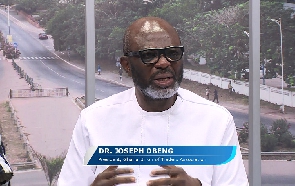- Home - News
- TWI News | TV
- Polls
- Year In Review
- News Archive
- Crime & Punishment
- Politics
- Regional
- Editorial
- Health
- Ghanaians Abroad
- Tabloid
- Africa
- Religion
- Election 2020
- Coronavirus
- News Videos | TV
- Photo Archives
- News Headlines
- Press Release
General News of Wednesday, 14 December 2011
Source: The Informer
Gov’t Rubbishes Court Ruling
Government of Ghana, through the Ministry of Energy has taken swipe at a High Court ruling which sort to create impression that the National Petroleum Authority (NPP) was unjustifiably imposing tax on the consuming public.
This position was made known through a bulletin signed and released in Accra, by a Deputy Minister of Energy, Hon. Emmanuel Armah Kofi Buah.
According to the release, government agrees with the NPA that the ex-refinery differential is not a tax, since it is stabilizing mechanism put in place by the NPA Board in 2006 to ensure the stability of petroleum product prices.
“The differential does not accrue to government”, the release has stated among other things, indicating that all funds that have been collected into the ex-refinery differential margin account, have been used by the NPA in stabilizing prices over the period.
This arrangement notwithstanding, the release explains, government subsided petroleum products to the tune of about GH¢459 million in 2011, with projections that the subsidy will reach almost GH¢600million in the year 2012, if the situation remains unchanged.
During the recent budget presentation, the Minister for Finance and Economic Planning reiterated Government's determination not to relent on its disciplined handling of the economy, even as the nation enters 2012, election year.
One of the big mistakes the government is determined not to repeat, is to allow the accumulation of unpaid petroleum subsidies, which in 2008 largely caused The Tema Oil Refinery’s (TOR’s) debt to reach an astronomical GH¢1.5 billion (15 trillion cedis) - a debt that largely brought the operations of TOR to a halt for about two years, and nearly crippled the Ghana Commercial Bank.
Over the last three years, the government has had to raise over 1 billion cedis to restore the financial health of both TOR and GCB.
The painful lesson learned through this recent history, according to government, is that no matter how long we postpone the inevitable; a time comes when we have no option but to confront the harsh reality and deal with it, and most often at a much greater cost. The government is determined not to allow a repeat of such costly option.
The court ruling, if allowed to stand, means the removal of the stabilizing effect that the ex-refinery margin account sought to achieve.
If the court ruling were implemented, the prices of various petroleum products would have gone up by the following percentages:
• Premium - 3.89% Kerosene - 77.57%
• Gas Oil - 13.36% LPG - 57.26%
• Premix - 114.46%
By every account the government will be irresponsible and insensitive to allow such drastic and dramatic skyrocketing of prices of petroleum products- a situation which will heap untold hardship on the people and end up worsening the economic conditions of Ghanaians.
It is in this regard that the Government supports the NPA’s motion for stay of execution and appeal.
The government believes that the issue of petroleum subsidies must be dealt with by clearly explaining to Ghanaians why the costly subsidies ultimately do more harm to the development of the nation and hold back the effort to alleviate the level of poverty in Ghana.
Given this backdrop the government will support the NPA to take the necessary steps to implement the deregulation policy to reflect market conditions, the statement concludes.
From the above revelations and statistics provided by the Ministry of Energy on behalf of government, we are totally shocked that the High Court in ruling seek to sow in the minds of Ghanaians as if the pricing formula used by the NPA was wrong, with claims that the ex-refinery differential is a tax, and so therefore, must be approved by parliament with all funds collected lodged into the Consolidated Fund.










